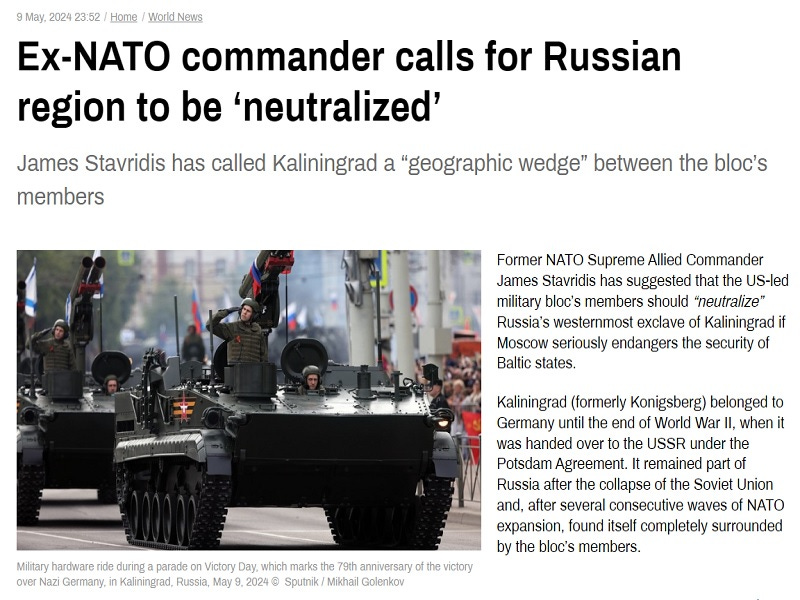The Former NATO Supreme Commander’s Call To “Neutralize” Kaliningrad Is Just A Bunch Of Hot Air
He knows that any first strike against Russia would spark World War III, but his hot air serves the purpose of boosting Western morale and falsely justifying NATO’s naval buildup in the Baltic Sea, which enriches the military-industrial complex.
Former NATO Supreme Commander Admiral James Stavridis wrote in his latest op-ed for Bloomberg that “Kaliningrad will need to be neutralized” in the event of war with Russia in order to prevent an attack against the Suwalki Corridor. This is nothing but a bunch of hot air and chest-thumping aimed at boosting Western morale ahead of Russia’s expected military breakthrough across the Donbass front lines. He knows very well that any first strike against Kaliningrad would instantly lead to World War III.
It’s become fashionable since the start of the special operation for Western commentators to fearmonger about a Russian invasion of NATO, which is meant to manipulate the public into accepting the bloc’s provocative military buildup along its neighbor’s borders on that false pretext. Finland and Sweden’s formal membership in NATO, which followed decades of closely coordinating all aspects of their policies with it as informal members, created fresh narrative opportunities in this respect.
After all, Stavridis’ lede is that the Baltic Sea has since transformed into a “NATO lake”, which he claims is tempting President Putin to meddle in member states’ affairs via cyber and electronic warfare like never before in response to their unprecedentedly large-scale drills there. This scenario closely resembles the one that Bild reported on in January citing allegedly leaked German Defense Ministry documents, which detailed the aggressive steps that Russia will allegedly take against the Baltics from then till May 2025.
Some of them concern ramped-up meddling of the sort that Stavridis regards as inevitable, but the reality is that this report from four months back simply served to precondition the public into accepting this speculation as fact in order to more easily manipulate them for the previously mentioned reasons. His piece in particular aims to generate widespread support for militarizing the Baltic even more than it already is, which is overkill considering the naval mismatch between NATO and Russia there.
It’s precisely because of this grossly lopsided balance of forces that Russia would certainly resort to nuclear weapons in self-defense as a last resort if Kaliningrad were to become the victim of unprovoked aggression by NATO via a first strike or some other means for strategically “neutralizing” it. This exclave’s primary purpose for Russia is to host its Baltic Fleet, but it’s also intended to deter NATO aggression by functioning as a launchpad for nuclear second strikes deep into Europe in the worst-case scenario.
Considering this, Stavridis’ piece is exposed as a morale-boosting information warfare product, not a practical policy recommendation. Its only importance rests in potentially manipulating more of the Western public into supporting NATO’s provocative military buildup along its neighbor’s borders on the false pretext that Russia is plotting to invade the bloc. Given the “mutually assured destruction” between Russia and the US, this isn’t for strategic purposes, but solely to enrich the military-industrial complex.




